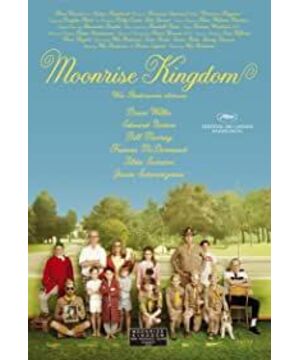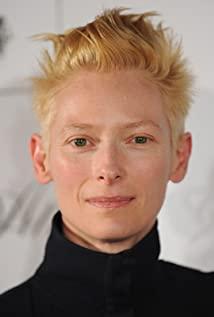In fact, catastrophe appears repeatedly in Anderson's sequence of works, and it is often a crucial node. Before the flood, he had written too many stories about the aftermath of his life. Just like those previous works, "The Kingdom of Moonrise" is another one with cracks, sorrow, and even death. Innocence and cruelty coexist, but life The joyous tragedy and comedy.
Problem children always love to "live elsewhere"
In a recent interview, Anderson admitted that he was defined by his parents as a "problem child" when he was a child. Most of his stories start from a family that is rifted, hurting each other but turning a blind eye, focusing on the child with the greatest problem. In the first feature film "Bottled Rocket" (1996), the siblings were admitted to the mental sanatorium; the three genius siblings in the masterpiece "The Genius" (2001) grew up in a family where their parents separated for a long time. After 30 years of age, they have become more and more deeply involved in the "heart disease" that erodes their normal lives; in "The Great Fox Daddy" (2009), Mr. Fox's only son, Ash always thinks that he will not get his father's favor. The pair of little mandarin ducks in "Yuesheng Kingdom" is an orphan who has transferred to multiple foster families and is about to be sent to the juvenile management institution; The direct reason for the decision to leave was that I found a book "How to Get along with Problem Children" at home.
Susie is 12 years old this year, wearing an elegant pink short skirt and heavy blue eyeshadow. He is unsmiling, quiet and wild. She is alive in another Margot in time and space-in "The Genius" Playwright played by Gwyneth Paltrow. These two girls are also marginal people in a multi-child family. Margot is an adopted daughter. Although her parents are good to her, her inconspicuous father always emphasizes her status as an adopted daughter to outsiders. Margot calmly agrees. , He didn't realize it was a kind of injury. When the parents separated, each child asked his father a question. She half-downed her head and asked carefully: "Is this our fault?"
Anderson often appears in male characters who still gain a sense of identity with his parents as an adult, such as the big brother in "The Genius Family", and Ned who runs to recognize his biological father in "Life of the Sea". But the girls are different. Faced with the lack of answers in reality, Margot and Susie chose to "live elsewhere." Margot writes, and Susie is immersed in fantasy novels all day, imagining that she is a magical heroine on a magical land. When Margot was a child, he took his brother Rich, who was also her lover, and ran away from home, quietly staying at night in the African area of the city's public archives, hiding under the display cabinet of taxidermy and sharing a sleeping bag. In this little fight, there is a subtle echoing feeling with Susie and Sam that eloped to an island that was alarmed.
Their confrontation with the world was externalized.
After the audience accompanied the two children through the threat of separation and death, they almost forgot to ask themselves what the name of the movie meant. At this time, Sam's painting at Susie's house reveals the answer. He drew the destination of elopement, a peaceful bay originally named after blunt geographic coordinates. He named it "Yuesheng Kingdom" in the painting. Just like the place Margot and Rich found in the archives, this is the secret kingdom where he and Susie fight against the real world.
The urge to escape from reality has always been the motif of Anderson's film cycles.
Rich traveled across several oceans to avoid Margot's marriage; in "Crossing Darjeeling" (2007), the three brothers who did not speak for a year gathered together in a distant foreign country. After Margot gave up writing for a while, her own bathtub became her private space to isolate her from the outside world. This is the phantom of Seglin. Except for "Bottled Rocket" which really put the protagonist in jail, Anderson's other protagonists are like Holden in "The Catcher in the Rye" in their trivial lives day after day. Although there are some derailments, they seem to be out of reach. Shocking the world, their most fierce confrontation with the outside world still takes place in their hearts, so a small space like a bathtub can become a "quarantine zone" that Margot insists on, so Anderson's movies are as targeted and interesting as a Hollywood melodrama. The "rising"-determined to become a truly great robber ("Bottled Rocket"), a teacher who pursues himself ("Young and Young"), wants to prevent his wife who has been separated for many years from empathizing ("The Genius Family"), chasing Killing a fish that eats up an old friend ("The Life of the Sea"), etc., but in the process of spreading out the narrative is often overwhelmed, disorderly and out of focus. Some people sum it up as "characters are bigger than stories."
It can be said that his two recent works have eliminated many of the previous negative reviews of broken plots and loose rhythms, not because the length of the movie has become shorter, but because the protagonist's inner confrontation with the world is "externalized". The struggle between Mr. Fox's natural wildness and the dragging middle class in life has turned into a hearty battle between him and the three black-hearted farmers. The contradiction between Susie and Sam and the adult world is externalized into two good scenes of their escape and round-up, Boy Scout rescue and round-up again.
The plot mode of Anderson's previous works often had big goals thrown out, but the protagonists didn't chase them hard, remembering that they were messing around with each other, often confused, until there was an unexpected catastrophe and everyone awakened together. The fox family, Sam and Susie had a clear purpose from the beginning and acted boldly. On the surface, I don’t know the so-called, but in fact, the subtle details are used to add the finishing touch: Father Fox encounters a free and vicissitudes of lone wolf on his way back to his teacher triumphantly. I once gave up freedom for the family; and emphasized that Susie played a raven in "Noah's Flood", which has hinted that they will have a happy ending. The raven is the first pathfinder after the flood. If it does not come back, it will prove that the mainland has been exposed.
This is not the fairy tale kingdom
. The reporter of "Sight and Hearing" magazine also noticed the similarity between Margot and Susie, and asked in an interview with Anderson. For repeating himself, Anderson explained it this way. Although he thought he was "making a completely different thing" every time, the finished product was always similar to the previous one because these "are all in the same operating system." run".
Anderson was able to create closed, self-operating small worlds in the movie, not only because of his unique character, but also because of his unique form. "Moonrise Kingdom" continues the lens language he is used to. Except for the three scenes between Susie and Sam, and between Sam and the policeman who finally adopted him, there is no "over-the-shoulder" scene in all the conversations, and the feeling of alienation between people is vivid. The iconic slow motion appeared in a scene where the pair of little mandarin ducks came out hand in hand after the wedding ceremony, setting off the absurd scene very solemnly.
In addition, the most used film is the combination of slow-moving and fast-panning. Slow movement seems to sweep the line of text, while fast shaking is like turning a page. Together, they imitate a reading effect. Coupled with the bright and bright colors based on the earthy yellow, standing in front of the audience are the children's books commonly found in the library. To be precise, they are the children's illustrated books with colorful plastic covers that Susie stole.
However, Anderson's closed world is not a fairy tale kingdom. "Moonrise Kingdom" is his first live-action movie rated PG13 in North America. Children under 13 need to be accompanied by their parents to watch, but in my opinion, it is more brutal than many R-rated movies (watched with the companion under 17)— -The little mandarin ducks and the Boy Scouts who came to hunt them face-to-face. Although the melee using air guns, scissors and bows and arrows was not live-streamed on the screen, so many people participated in the battle, and unfortunately only an innocent puppy Snoopy was killed. .
If he mixes with Hollywood, the script will definitely be rewritten, and the company's senior executives will be killed before the filming is submitted for review. In the horror film with the highest risk factor, kittens and puppies are also safe. A horror movie survival guide written by passers-by said that it is safer than following the highest paid celebrity, that is, following cats and dogs, their chances of surviving to the end are 100%. For example, in "Alien" (1979), the heroine is an iron girl who does not show any emotion beyond rationality to any of her companions, but at present, the enemy has not forgotten tenderly calling her lost cat, flower. After spending a lot of time looking for it, after the death of a boat at the end of the film, it is this cat who accompanies her to drift down in the boundless universe.
The special treatment of cats and puppies in commercial films is essentially a maintenance of the security barrier between the screen and the audience. When the audience walked into the theater, it was clear that they were looking for a dream, not really wanting to be scared or heartbroken. Seeing wounds but not blood, this kind of processing that goes against the logic of reality is not only used in fighting scenes, but also in the performance of emotional relationships. Cats and dogs are safe, is the iron law of commercial films to appease the audience. If kittens and puppies are not protected in the movie, it is equivalent to children not being protected, and human justice and courage have all failed.
But Anderson's seven feature films have four plots that hurt dogs, and two of them lost their lives. There is also a slightly uncomfortable plot in "Moonrise Kingdom", which specifically mentions that the boy who was stabbed by Susie injured his kidney. The film emphasizes that this is not punishment: Susie asks if Sam Snoopy is a good dog, and Sam answers "who knows, but it shouldn't be dead". I think the message that the author wants to convey is that no one is truly safe. It is the same in his small world and in our big world.
What about "Yuesheng Kingdom"? Same thing too. Didn’t the two children finally be found there? It does not protect them. Anderson said in that interview, "A person's life is full of magical moments, and I guess those moments will become a person's landmarks or milestones." I understand that these landmarks are not completely physical, cannot be restored, and cannot be revisited. Instead, they are deposited in people's hearts with a wonderful life journey, giving us the power to regenerate.
View more about Moonrise Kingdom reviews










